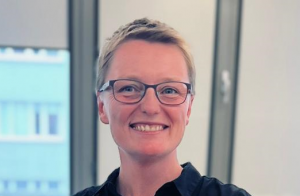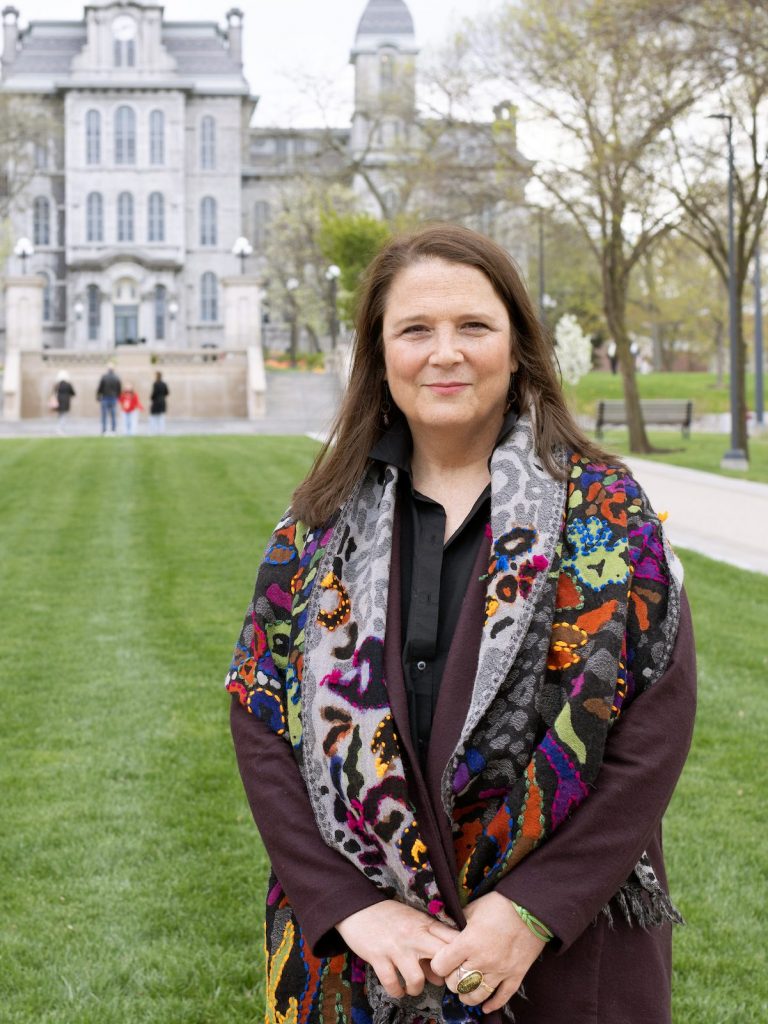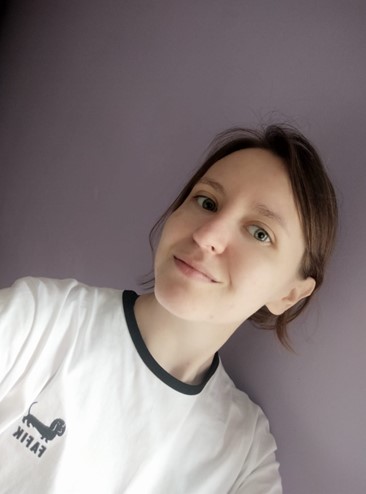Juliet D. Golden
Juliet D. Golden is the Director of the Syracuse University Abroad Central Europe Program. Her research and teaching center on the politics of memory, the history of women and public health, and architecture and public space in Central Europe. Through her work in study abroad over the past 15 years, she has brought students into active conversation with the physical spaces of Central Europe’s built environments marked by devastation wrought by two world wars and by the Nazi and communist totalitarian regimes. Her pedagogical approach supports students’ capacities of historically informed understanding and interpretation of contemporary politics and society, and their potential for civic engagement in the global context.
In 2016, she was the co-recipient of the Award for Excellence in Education Abroad Curriculum Design by the Forum on Education Abroad. In 2020, she also received the Teaching Recognition Award at Syracuse University.
 Ula Klobuszewska
Ula Klobuszewska
Ula Kłobuszewska is the Program Coordinator for the Syracuse Abroad Central Europe program and a director of the Project Office at the University of Lower Silesia, SU Abroad’s partner institution in Wroclaw, Poland. She has been involved in international educational and research projects at the University of Lower Silesia since 2007, coordinating international programs for study abroad students from Europe and the US. She holds an M.A in Journalism and Social Communication from the University of Wrocław and a Ph.D. in education as a recipient of a European Union scholarship financed through the EU Social Fund. Her research interests include international education, learning and teaching of foreign languages, and globalization.
Anita Jakubik
Anita Jakubik is the Student Activities Coordinator for the Syracuse Abroad Central Europe program. Anita, together with Ula, is responsible for the organization of the program in Wroclaw and for your well-being while you are in Poland. She will be on site all the time while you travel and stay in Wroclaw.
Adam J. Chmielewski
Adam J. Chmielewski is Professor Ordinarius in the Institute of Philosophy, University of Wrocław, Poland. He is also a social activist and political columnist. He studied philosophy and social sciences at the universities in Wrocław, Oxford, New York and Edinburgh. An author and translator of several books, he is the Editor-in-Chief of the Studia Philosophica Wratislaviensia, and a member of editorial boards of several Polish and international journals. In 2011, as a director of the institution of culture Wroclaw 2016, he played crucial role in winning the title of the European Capital of Culture 2016 for the city of Wroclaw, authoring the successful bid of the city for this title.
Karol Kociszewski
Karol Kociszewski is a professor of economics at the Wroclaw University of Economics and Business in the Department of Ecological Economics. He holds degrees in international trade as well as a Ph.D. in ecological economics. His interests include sustainable development with special consideration of agriculture and rural areas and development economics with a particular focus on transition countries. He is the author and co-author of several books and over one hundred scientific papers. His university teaching (with 20 years of experience) is focused on development economics, international protection of environment, environmental and resource economics and history of economic theory.
Zofia Kolbuszewska
Zofia Kolbuszewska teaches Exploring Culture and Society in Transition: Gender, Sexuality, Ethnicity, and Disability in Poland. She holds a Ph.D. and a post-doctoral degree in American Literature from the Catholic University of Lublin, Poland, where for 20 years she also taught courses in Polish culture and film. She was a Senior Fulbright Scholar at Columbia University and a Kosciuszko Foundation Research and Teaching Fellow at SUNY, University at Buffalo, where she taught courses on Polish history, culture, and cinema. While her recent work focuses on the intersections of media and literature as well as the cultural dynamics of failure in all its social dimensions, she has also written and taught courses on contemporary gothic, cultural ramifications of melancholy, and contemporary forensic imagination.
Lotar Rasinski
Lotar Rasiński is a professor of philosophy at the University of Lower Silesia. He will teach the new course Art, Social Action and the City, in which students investigate the generative powers of cities to be transformed into sites of democratic struggle and engagement. He also co-teaches with Adam Chmielewski, Discord and Unity: Engaging Contemporary World through Ethics and Philosophy, a unique exploration of how philosophy can help us understand and engage in thinking through some of the fundamental dilemmas of our times. For his latest book entitled, In the Footsteps of Marx and Wittgenstein. Social Criticism without Critical Theory (2012, in Polish) he was awarded the top academic honor by the Prime Minister of Poland (2014). He specializes in contemporary political philosophy, philosophy of language, and critical theory.
Łukasz Rogozinski
Łukasz Rogoziński is a Polish language teacher of two courses Polish 101and Survival Polish. He holds an MA in Polish Philology and has taught courses about Polish as a foreign language since 2007. He is author and co-author of several papers in phonetics and corpus linguistics as well as a member of the editorial board of peer-reviewed journal Baltica ~ Silesia. He is currently preparing his Ph.D. dissertation on the articulation of Polish language sounds by the Latvians.
Bozena Szaynok
Bozena Szaynok co-teaches the history course East Central Europe in the 20th Century. She holds a PhD from the University of Wroclaw, where she is currently a professor in the department of history. She is also a visiting professor at the University of Illinois at Chicago. In the past, she has been a guest lecturer at the University at Chicago, Central Connecticut State University, Yale University, Columbia University, the United States Holocaust Memorial Museum, Brandeis University, West Virginia University, the Sorbonne, the University of Tel Aviv, Hebrew University and the University of Leipzig. She has published widely in Polish, English and Hebrew and has been the recipient of numerous prestigious scholarships and awards. Her research interests include Polish-Jewish-Israeli relations, the history of Poland and Eastern Europe after WWII, and the history of the Catholic Church in Poland after WWII.


